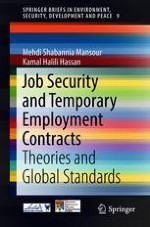This book discusses the need of a legal protection at national and global levels to address the use of temporary employment contracts by employers. Chapter 1 reviews some theories of job security, showing how job security issues should be regulated in labour laws to protect workers and also how temporary contracts affect job security. Chapter 2 examines legal protection of job security in temporary contract in international contexts where it examines the concept and need for job security and job protection especially for temporary contracts based on three United Nations’ instruments, namely, the Universal Declaration of Human Rights (UDHR), International Covenant on Civil and Political Rights (ICCPR), and International Covenant on Economic, Social and Cultural Rights (ICESCR). Chapter 3 studies the ILO standards in relation to job security and temporary contracts as well as those covered by the Philadelphia Declaration and other conventions and recommendations. Chapter 4 discusses Islamic jurisprudence on jobs and job security. The main aims of this chapter is to provide the framework for protecting workers as a means to enhance job security in the world especially in Islam. It discusses Islamic jurisprudence concerning work and job conditions. The Islamic precept is based on the Qur’an and Hadith and these sources are used to explain the concept of jobs in Islam. In addition, this chapter also examines the Cairo Declaration on Human Rights in Islam (CDHRI).
